The most unusual finds of customs officers
Categories: World
By Pictolic https://pictolic.com/article/the-most-unusual-finds-of-customs-officers.htmlOctober 25 marks the Day of the Customs Officer of the Russian Federation. And it turns out that the holiday is old - it was on this day in 1653 that the Unified Customs Regulations first appeared in the country, born from the decree of Tsar Alexei Mikhailovich on the collection of customs duties "in Moscow and Russian cities." In honor of the holiday, we recall the most unusual finds of customs officers around the world.
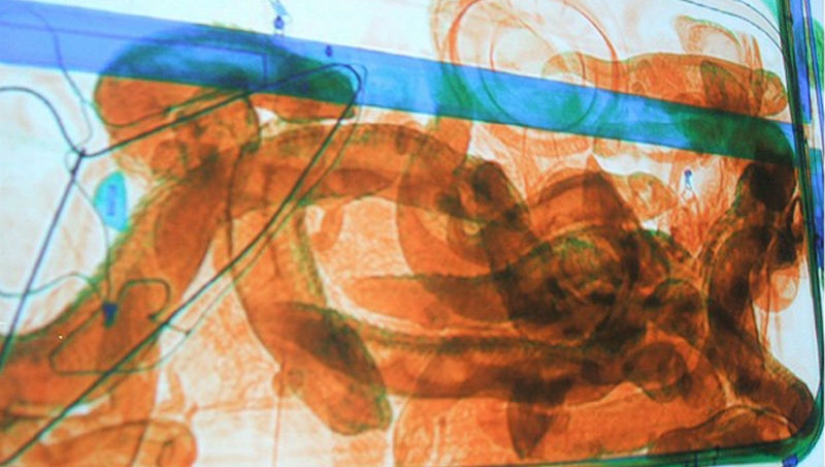
It is difficult to surprise customs officers - they have seen everything over the years of service. But sometimes smugglers try to transport very unusual and strange objects.
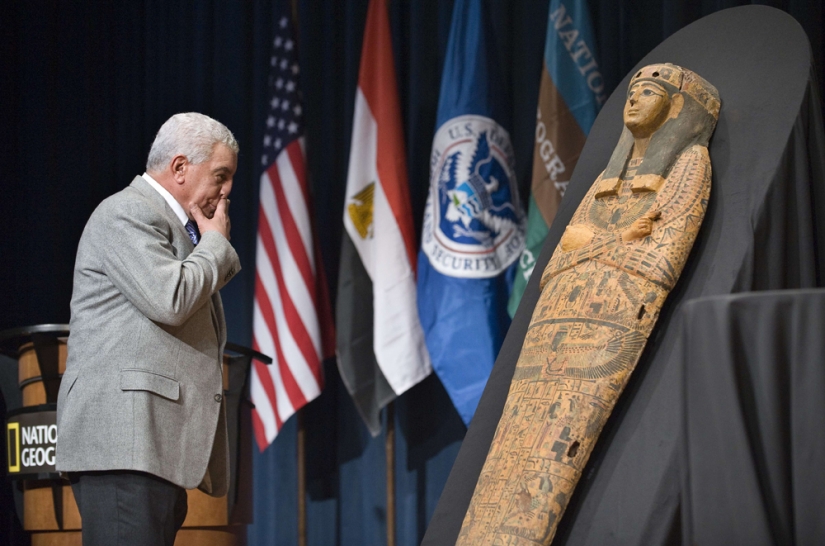 Customs officials at Miami Airport were stunned to find this 3,000-year-old Egyptian sarcophagus. It was an odd piece of luggage to take out of Spain. Zahi Hawass, then head of Egypt's Supreme Council of Antiquities (left), had traveled to the US to pick up the sarcophagus, which was believed to have been stolen from Egypt more than 100 years ago. (AFP/Getty Images)
Customs officials at Miami Airport were stunned to find this 3,000-year-old Egyptian sarcophagus. It was an odd piece of luggage to take out of Spain. Zahi Hawass, then head of Egypt's Supreme Council of Antiquities (left), had traveled to the US to pick up the sarcophagus, which was believed to have been stolen from Egypt more than 100 years ago. (AFP/Getty Images)
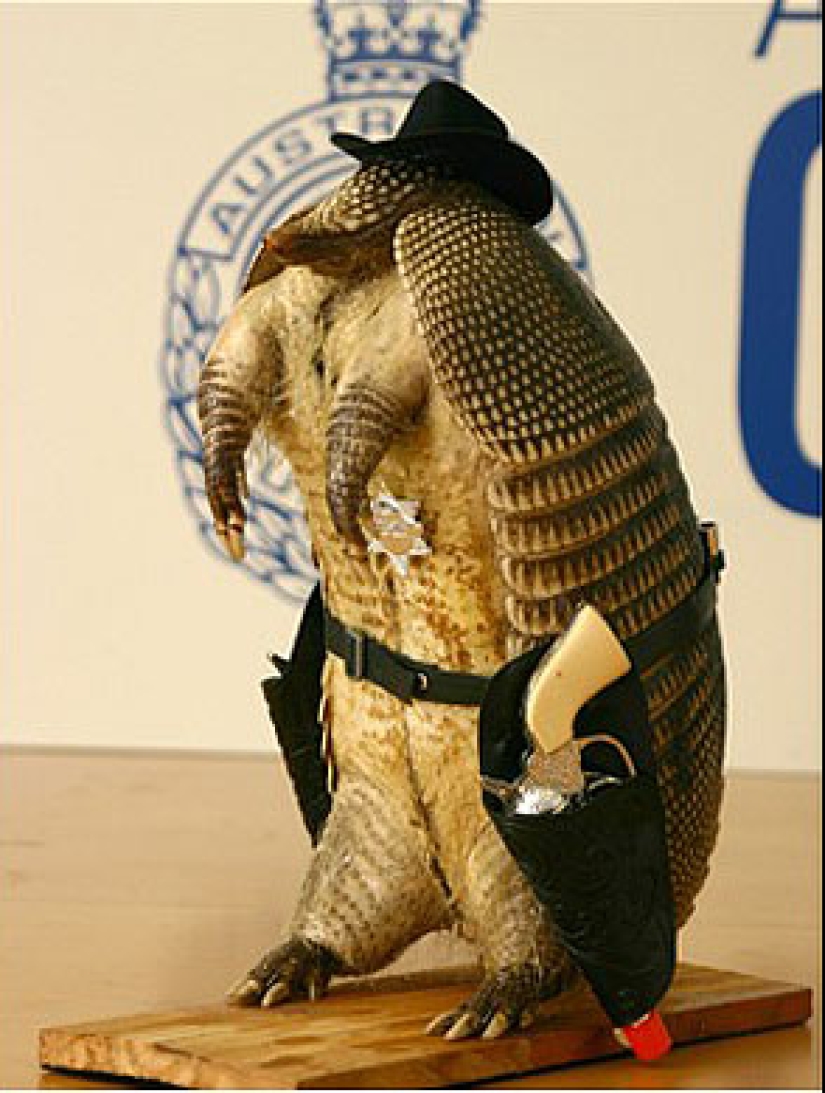
This armed armadillo was sent to Australia from Texas as a gift, but was confiscated in Sydney for breaching Australian wildlife import laws. Customs officials even joked that "it's so tasteless that it's the only reason it should not be allowed into the country." (Australian Customs and Border Protection Service)
 Munich airport workers were shocked to discover a skeleton in the luggage of two Italian women during a scan. The women said the remains belonged to a relative who had died in Brazil and they wanted to bury them in Italy. After producing a death certificate stating the man had died of natural causes, the women were allowed to take the remains home. (Arthur Turner / Alamy)
Munich airport workers were shocked to discover a skeleton in the luggage of two Italian women during a scan. The women said the remains belonged to a relative who had died in Brazil and they wanted to bury them in Italy. After producing a death certificate stating the man had died of natural causes, the women were allowed to take the remains home. (Arthur Turner / Alamy)
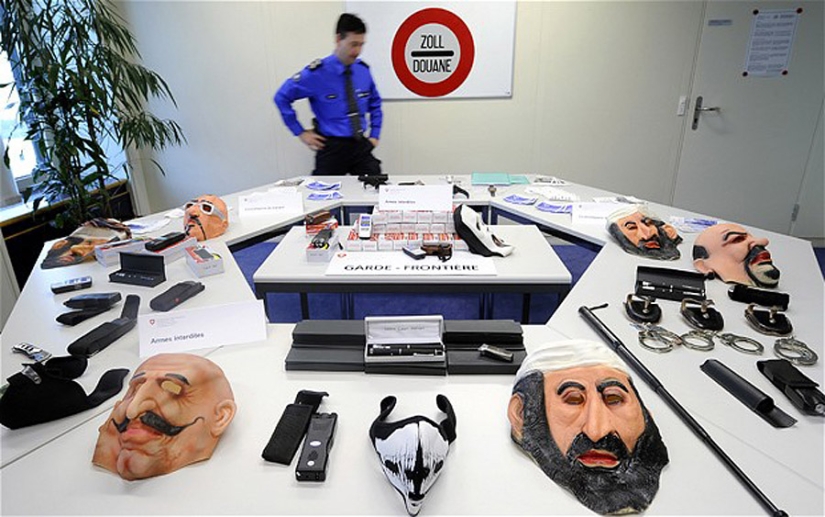 Illegal weapons have long topped the list of items most often confiscated at customs, but not every suitcase boasts such a variety of masks. This set was confiscated at the Swiss border from a group of Frenchmen. (AFP/Getty Images)
Illegal weapons have long topped the list of items most often confiscated at customs, but not every suitcase boasts such a variety of masks. This set was confiscated at the Swiss border from a group of Frenchmen. (AFP/Getty Images)
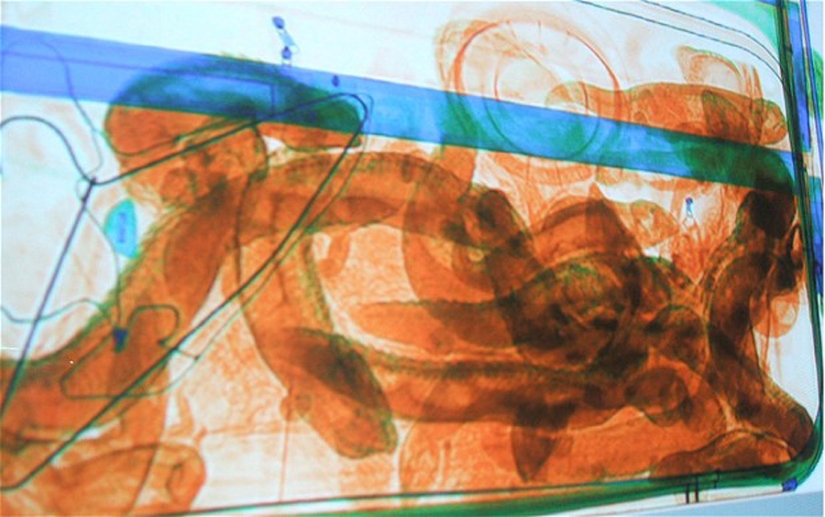 A 24-year-old man was arrested at Sydney Airport in 2009 for attempting to smuggle four snakes and different species of lizards in his luggage. (Australian Customs and Border Protection Service)
A 24-year-old man was arrested at Sydney Airport in 2009 for attempting to smuggle four snakes and different species of lizards in his luggage. (Australian Customs and Border Protection Service)
 In 2009, officials at John F. Kennedy Airport in New York detained a Korean passenger who was found to be in possession of two $100,000 bills. The rare notes were issued in 1934 but never entered general circulation. Naturally, the Korean's bills turned out to be counterfeits. (Peter Titmuss / Alamy)
In 2009, officials at John F. Kennedy Airport in New York detained a Korean passenger who was found to be in possession of two $100,000 bills. The rare notes were issued in 1934 but never entered general circulation. Naturally, the Korean's bills turned out to be counterfeits. (Peter Titmuss / Alamy)
 UK customs officials once confiscated a rather terrifying pair of Freddy Krueger-style gloves from a post office. (Photos 12 / Alamy)
UK customs officials once confiscated a rather terrifying pair of Freddy Krueger-style gloves from a post office. (Photos 12 / Alamy)
 At the Lewiston-Queenston border between Canada and the United States in 2008, a 50-year-old Barbadian man aroused the suspicions of a customs officer by declaring 100 bottles of "holy water." The holy water turned out to be liquid ketamine. (First Light / Alamy; US Customs and Border Protection)
At the Lewiston-Queenston border between Canada and the United States in 2008, a 50-year-old Barbadian man aroused the suspicions of a customs officer by declaring 100 bottles of "holy water." The holy water turned out to be liquid ketamine. (First Light / Alamy; US Customs and Border Protection)
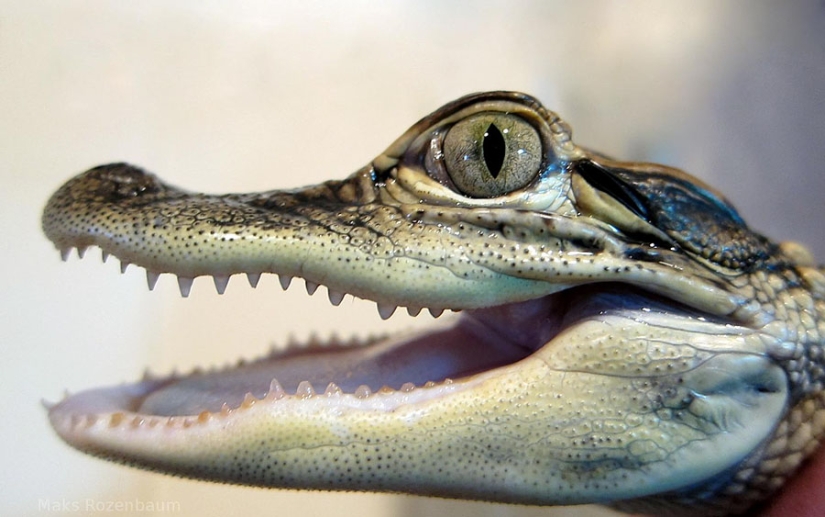 Hats off to the ambition of a smuggler who attempted to transport 70 animals, including crocodiles (pictured), in his luggage on a flight from Bangkok to Johannesburg in 2009. (Jacqueline Roberts / Alamy)
Hats off to the ambition of a smuggler who attempted to transport 70 animals, including crocodiles (pictured), in his luggage on a flight from Bangkok to Johannesburg in 2009. (Jacqueline Roberts / Alamy)
 Munich airport workers once found a decomposing monkey head in their luggage, which they identified by smell. Luckily, we don't have a photo of it. (Avatra images / Alamy)
Munich airport workers once found a decomposing monkey head in their luggage, which they identified by smell. Luckily, we don't have a photo of it. (Avatra images / Alamy)
 Speaking of heads, Denver airport customs officials were shocked and disgusted to find a severed seal head in a biology teacher's bag. The professor said he had cut it off a dead seal and would use it for "educational purposes." (Jason Roberts / Alamy)
Speaking of heads, Denver airport customs officials were shocked and disgusted to find a severed seal head in a biology teacher's bag. The professor said he had cut it off a dead seal and would use it for "educational purposes." (Jason Roberts / Alamy)
 In 2010, more than 350 replica Faberge eggs were found at Paris' Charles de Gaulle airport. They had been smuggled out of Russia. (AFP/Getty Images)
In 2010, more than 350 replica Faberge eggs were found at Paris' Charles de Gaulle airport. They had been smuggled out of Russia. (AFP/Getty Images)
 Greek police have charged two American tourists with desecrating the dead after finding six human skulls in their carry-on luggage. The tourists said they had bought the skulls at a souvenir shop and thought they were fake. (nicolas nadjar / Alamy)
Greek police have charged two American tourists with desecrating the dead after finding six human skulls in their carry-on luggage. The tourists said they had bought the skulls at a souvenir shop and thought they were fake. (nicolas nadjar / Alamy)
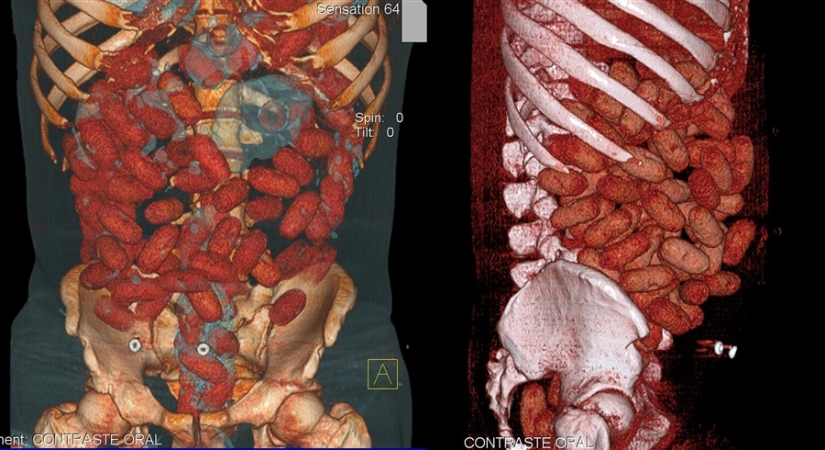 And this “cargo” has not yet been confiscated… This image, obtained during scanning and provided to the media by the Brazilian Federal Police, shows packets of cocaine in the gastrointestinal tract of a 20-year-old Irish citizen who was arrested by Brazilian police at Congonhas Airport in Sao Paulo. The young man, whose name has not yet been released, was stopped while trying to board a plane bound for Brussels. The arrested man had 72 packets in his intestines, containing almost a kilogram of cocaine.
And this “cargo” has not yet been confiscated… This image, obtained during scanning and provided to the media by the Brazilian Federal Police, shows packets of cocaine in the gastrointestinal tract of a 20-year-old Irish citizen who was arrested by Brazilian police at Congonhas Airport in Sao Paulo. The young man, whose name has not yet been released, was stopped while trying to board a plane bound for Brussels. The arrested man had 72 packets in his intestines, containing almost a kilogram of cocaine.
Recent articles

It's high time to admit that this whole hipster idea has gone too far. The concept has become so popular that even restaurants have ...

There is a perception that people only use 10% of their brain potential. But the heroes of our review, apparently, found a way to ...

New Year's is a time to surprise and delight loved ones not only with gifts but also with a unique presentation of the holiday ...